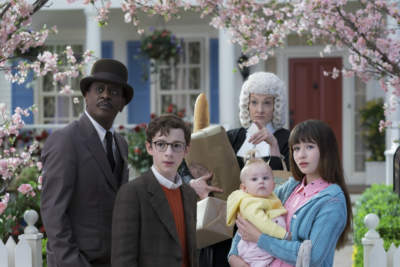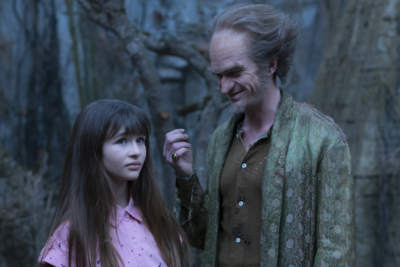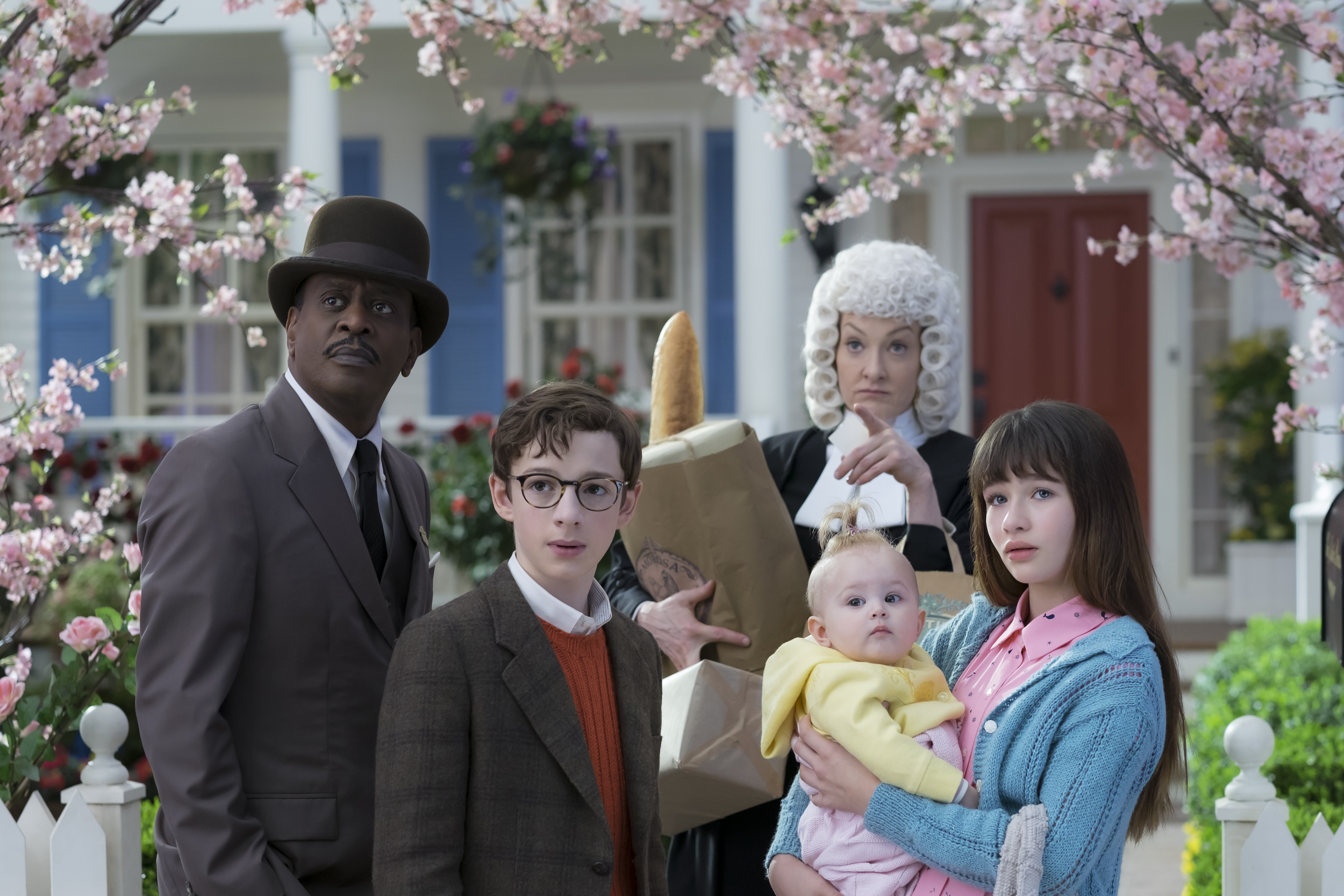Almost 20 years since the publication of “The Bad Beginning” and thirteen years (a fittingly unlucky figure) since its film adaptation, Netflix has given Lemony Snicket’s book series, “A Series of Unfortunate Events,” new life. Filled with incredible actors, breathtaking sets designs, and an engaging plot infused with humor and melancholy, the new show is everything fans could have hoped for after all this time. More than that, it’s chock full of Jewish references thanks to the mysterious man behind the miserable manuscripts, Lemony Snicket, who has more of a background in Yiddishkeit than one might think.

His stories – which I voraciously devoured in my more formative years – chronicle the wild woes of the Baudelaire orphans Violet, Klaus, and Sonny who, after the death of their parents in the very fiery destruction of their mansion, are shunted from one legal guardian to the next over the course of 13 books. All the while, they’re pursued by the dastardly, costume-shifting villain Count Olaf (played by Neil Patrick Harris in the show) who is after the enormous fortune the Baudelaire parents left behind.
The Baudelaire surname alludes to the famed French poet Charles Baudelaire, who said, “The finest trick of the devil is to persuade you that he does not exist.” It’s a phrase more commonly associated with Keyser Söze than with French intellectuals of the late 19th century, but it perfectly sums up the world of “A Series of Unfortunate Events,” where adults are grossly incompetent and can’t see deadly danger staring them directly in the face. It’s a suburban gothic universe filled with secrets, devoid of justice… and popping with nods to Judaism. Not such a far-fetched idea when you take into account the seemingly endless suffering and, dare I say it, unfortunate events endured by the Jewish people over the centuries.

While the editors of The Daily Punctilio, a tabloid in “A Series of Unfortunate Events,” would be inclined to disagree with me, Lemony Snicket is alive and well; he is also quite the cordial and forthcoming fellow (who most certainly could not be capable of the arson and murder he is accused of by such a preposterous publication). However, any true fan of “A Series of Unfortunate Events” would know that Lemony Snicket is simply a pseudonym, the literary persona of Jewish author Daniel Handler, whose perfect blend of child-friendly nihilism and absurdity captured the rapt attention of the “Harry Potter” generation.
Unlike his pen name, Handler was more than willing to hop on a call with a journalist to discuss the new show’s Jewish influences, what we can expect in Season 2, and his attempts to teach Hollywood to speak Yiddish.
Josh Weiss: So, first off, congratulations on the show.
Daniel Handler: Thank you!
JW: I binged it this past weekend and it was incredible… First question, I was wondering if you could start off by telling me a little bit about your Jewish background growing up.
DH: Um, I had a fairly standard Reform Jewish upbringing, I guess, in terms of the religious side of it. On the cultural side, my father’s family fled Germany in 1938 and 1939 and some of them made it and some of them didn’t. And so, I grew up with a close-knit group of actually fairly distant relatives who were all survivors of – I mean they weren’t all survivors of camps by any means – but they were all survivors of getting out of Germany just in time. And I was fed by stories of how good behavior is not necessarily reward and bad behavior is not necessarily punished, so I think that shaped my world view.
JW: That’s incredible. And how did your Jewish upbringing eventually find its way into your writing, specifically when it came to relaying the unpleasant plight of the Baudelaires?
DH: Well, I’ve always thought that “A Series of Unfortunate Events” is basically a Jewish story. Certainly I’ve heard from readers all over the world who have found themselves in its pages, and so I never like to identify everyone as being Jewish or something like that, but I think the kind of wry but soulful look at suffering comes from a long tradition of Jewish literature.
JW: Whose idea was it for those [Jewish] themes and concepts to carry over into the show (i.e. Justice Strauss bringing up the concept of a mitzvah or “The Marvelous Marriage” band playing “Hava Nagila”)?
DH: I mean, I guess it was my idea… but I mean I think it was an idea that people took to. So, some of the references, the Jewish references, are mine and then some of them were invented by other people and inspired from my doing that.
JW: That kind of touches on my next question. Was there ever any worry on the part of the show producers that some of the references might go over the heads of viewers?
DH: I would say not specifically the Jewish references necessarily. I mean, there are a lot of literary references too, so I think the biggest argument we had with Netflix was over Brillat-Savarin, the 19th century French gourmand and philosopher [laughs], who’s not Jewish but is also obscure. But I think there was a sense that we could inscribe a language that was being spoken by the characters that – even if it wasn’t understood for what it was – that it was understood for being part of a world that was slightly Jewish in tone so that if you don’t know what a bar mitzvah is, you still have a sense that people are talking about something. And I think, you know, most people by now know what a bar mitzvah is.
JW: [laughs] Yeah. So, you’ve also kind of touched on this [but] if you had to compare “A Series of Unfortunate Events” to a particular cornerstone, idea, or story in the Jewish faith what would it be?
DH: Well, I guess those stories of my own family and the stories that I heard around the dinner table and at family gatherings would be the ones that sunk in deep enough for me. I was always confused and haunted by the story of the [binding and] sacrifice of Isaac, for sure, but I think just about any traditional Jewish story is going to have crazy suffering in it, so I liked all of them [laughs].
JW: Can we count on more nods to Judaism popping up next season, and can you offer up any hints or clues?
DH: Yeah, we’re writing Season 2 now and there are certainly plenty of Jewish references. We had a conversation about the word tzuris and what that meant, so I guess that would be enough of a hint [laughs]… It’s a [Yiddish] word for kind of trouble and bad luck and suffering. You would have to have something of a Yiddish sense to know how to use it so we use it a few times in one episode, and I was trying to explain to people what it means exactly – and that’s with many Yiddish terms. Once you start explaining it, you realize that you don’t really know. You can use it in context, and you know when the context is wrong, you know when it’s being used incorrectly, but it’s actually hard to define. So that was a nice day…
JW: [laughs] That’s awesome. That’s a great segue into my next question, and this one’s a bit of a challenge. If V.F.D. [the mysterious three letters that pop up throughout the books and may or may not represent the name of a super secret fire fighting organization] were to stand as an acronym for a Yiddish phrase, what would it be?
DH: Oh gosh! Well, I don’t have my Yiddish dictionary handy [laughs], so I’m gonna think. I’m gonna have to take a pass on that. But I would love to hear from any readers of New Voices of Jewish expression suggestions for V.F.D. That’s a lot!
JW: We’ll get back to you. I tried it myself, I couldn’t come up with anything, so we’ll work on it. So, next question: Is there anything in forthcoming seasons that you’re looking forward to revisiting in the scripts or see come alive on screen – like a certain book or moment?
DH: Oh gosh, I mean, I’m working so hard on that now that it’s kind of all of them. We’ve been working on the operating scene in “The Hostile Hospital.” I’m excited about that. We’ve been working on some of the scenes in “The Vile Village.” I’m quite proud of the Cafe Salmonella scene that’s happening in “Ersatz Elevator,” so there’s a lot.
And it’s been really marvelous to write to the second season when we know who the main cast actors are too. We have a bunch of guest stars that we’re casting, but we had to write Season 1 kind of in a vacuum and then change it as the actors came into fruition. But now just to know who’s playing Mr. Poe and just to know what kind of lines K. Todd Freeman is really good at and to write them is a really fun time.
JW: Awesome. Can’t wait. And two more questions. Are there any plans to turn “The Latke Who Couldn’t Stop Screaming”[your children’s book] into a movie or TV show?
DH: [laughs] Not that I’m aware of… It’s been presented on the stage a few times. Just about every holiday season, some Jewish theater company or other is putting it on, and that always charms me. I like the idea of someone in a latke costume onstage. That seems like a fun time to me.
JW: You never know, maybe Pixar might get the rights to it.
DH: [laughs] It’s hard for me to imagine that story fleshed out into something feature length, but I admire your optimism.
JW: [laughs] And my final question is, do you have any thoughts or a message for fans who are returning to the series after such a long time?
DH: I hope whatever trauma they had the first time has passed and I’m worried for any [traumatizing] experience in the future.
JW: Thank you, I really appreciate you taking the time. I grew up with your books so just thank you so much.
DH: Well, that’s very nice to hear. I appreciate your interest. Give my regards to everyone at New Voices.
JW: I will. Thank you, and have a Shabbat shalom.
DH: Thank you, you too!
Josh Weiss is a senior at Drexel University in Philadelphia, studying Communications with a concentration in Public Relations.

